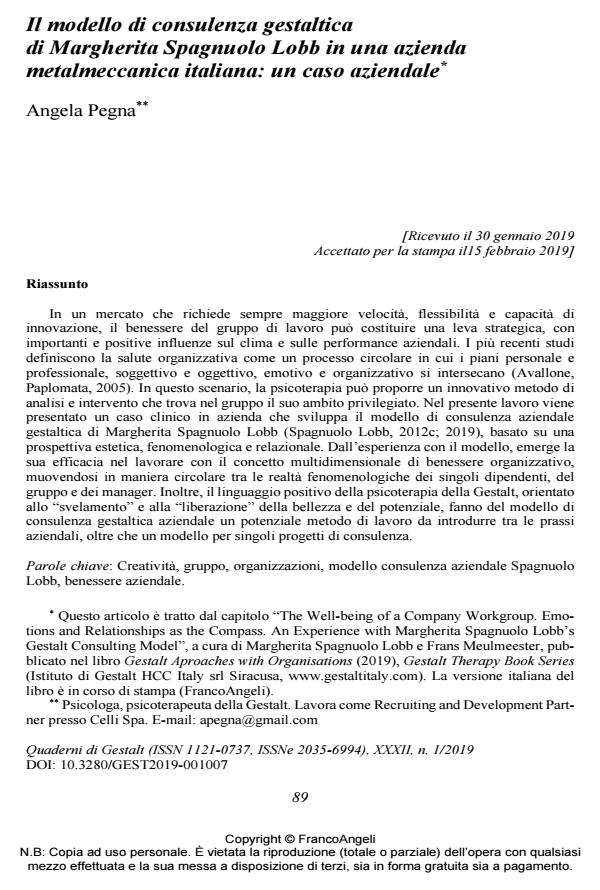Margherita Spagnuolo Lobb’s Gestalt Consulting Model in an Italian Engineering Company: A Business Case
Journal title QUADERNI DI GESTALT
Author/s Angela Pegna
Publishing Year 2019 Issue 2019/1
Language Italian Pages 14 P. 89-102 File size 189 KB
DOI 10.3280/GEST2019-001006
DOI is like a bar code for intellectual property: to have more infomation
click here
Below, you can see the article first page
If you want to buy this article in PDF format, you can do it, following the instructions to buy download credits

FrancoAngeli is member of Publishers International Linking Association, Inc (PILA), a not-for-profit association which run the CrossRef service enabling links to and from online scholarly content.
In a market which requires more speed, flexibility and innovative capacity, welfare of the workgroup may constitute a strategic lever which aptly influences business environment and performance. The most recent studies on organization well-being concur with the definition of it as a circular process in which personal and professional, subjective and objective, emotional and organizational planes intersect (Avallone, Paplomata, 2005). Against this backdrop, psy-chotherapy may provide an innovative analysis and method of intervention that relies on the group as its privileged field as place in which emotions and individual expectations mingle with business management and system. In this paper, we present show a case study in a com-pany that develops Margherita Spagnuolo Lobb’s Gestalt Model of Organizational Consulting (Spagnuolo Lobb, 2012c; 2019). This model is based on aesthetic, phenomenological and rela-tional perspective. Two principal criteria of organizational group wellness are described by the model: the synchronic and the diachronic criteria. An obervational tool for groups is presented that can be used by Gestalt organizational counselors. It is an interview tool to analyze the manager’s culture regarding organizational groups. Data from group interviews is then inte-grated with the counselor’s consulting report to the manager who asked for this service. Hav-ing tested this model ourselves, we can show its effectiveness in working with the multidi-mensional construct of organizational well-being in moving circularly among the phenomeno-logical realities of employees, management and the whole group (representatives of organizational culture and business management model). Moreover, the positive language of Gestalt psychotherapy which is oriented towards "disclosure" and "deliverance" of beauty and poten-tial, makes the Gestalt Model of Organizational Consulting an effective prospective working method to introduce into the Business Management System as well as a model for single consulting project.
Keywords: Creativity, group, organization, Spagnuolo Lobb OD model, company well-being.
Angela Pegna, Il modello di consulenza gestaltica di Margherita Spagnuolo Lobb in una azienda metalmeccanica italiana: un caso aziendale in "QUADERNI DI GESTALT" 1/2019, pp 89-102, DOI: 10.3280/GEST2019-001006